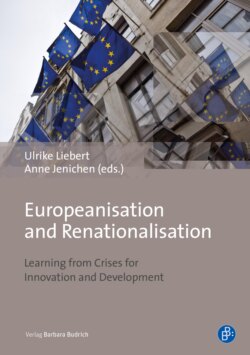Читать книгу Europeanisation and Renationalisation - Группа авторов - Страница 29
На сайте Литреса книга снята с продажи.
5. The partisan debate about joining the European common currency
ОглавлениеIn the CR, the economic crisis nevertheless had one fundamental effect, this time directly. The ailing debate on adopting the common European currency taking place before the crisis was essentially finished. This can be seen in the opinion of Miroslav Kalousek, the conservative (though pro-European) Finance Minister, who already had doubts about Euro adoption in October 2008.
I have always been convinced that an early adoption date for the euro is the correct path. But at a moment when many Eurozone countries say that the Stability and Growth Pact must not be essential and important, we must carefully think about a Eurozone entry date (Idnes.cz 2008).
This was the same minister who in May 2007 had explicitly proposed an adoption date of January 1, 2012 (Novinky.cz 2007). The Prime Minister and head of the Eurosceptic ODS eventually shelved euro adoption indefinitely in 2010, de facto arguing that it would be a poor fit for the CR in the long term. For them, adoption of the common currency would only be possible when “the costs of keeping the crown outweigh the costs of joining the euro” (Idnes.cz 2010). After that point, Czech parties practically began to compete over who least wanted to deal with euro adoption. The Euro-optimistic Social Democrats, led by Bohuslav Sobotka, proposed a date of around 2020 shortly after taking power in 2014 (Česká televize 2014). However, under pressure not from economic forces, but clearly political ones, the PM had to backtrack on quick euro adoption. Not only did he announce that his government would not set a date for euro adoption, he approached euro adoption in general rather sceptically. “If we do not achieve balanced budgets and continue with convergence, then we cannot propose a date for euro adoption” (České noviny 2016).
For an analysis of the reasons why Czech political parties have for all practical purposes ruled out timely adoption of the euro, it is necessary to look at changing public discourse over time, and hand in hand with it the course of the economic crisis. From the point of view of agenda setting, the coalition party ANO has presented itself very pragmatically since 2014; at every step, the party keeps an eye on public opinion, which has not been favourable. Babiš [57] thus began to explore the idea of a referendum, but after a long time explained that while he was an opponent of the euro, he also saw its advantages. In the media, however, he more often focused on disadvantages. “Everybody knows that Greece doesn’t pay its debts” (Česká televize 2015). He increasingly hinted at his stance against adoption of the common currency.
As long as I am Minister of Finance and Greece is a member of the Eurozone, I will be against entry. The Eurozone has rules for new members to enter, but it doesn't know how to deal with those who should leave, with those who don't belong there (Ministry of Finance of the CR 2015).
In this situation, when a key coalition partner refuses to discuss the adoption of the European currency, and the Social Democrats led by the Prime Minister announce that euro adoption is not domestically suitable, then the euro issue in the CR is virtually dead, or at least dormant for the next several years. It is thus not necessary to dwell on the fact that the current refusal to debate about euro adoption has not been about the lack of fulfilment of the convergence criteria, as the CR in recent years has fulfilled all the adoption conditions (inflation, national budget deficit, overall national debt, and interest rates of the central bank) except for participation in the European Exchange Rate Mechanism (which was a conscious decision). As pointed out above, the stifling of debate on setting a date for euro adoption can be seen in the very low level of public support for such a step. While there was clear support for euro adoption by the Czech population in 2001-2005 (always over 50%, see CVVM 2015), in 2006-2009, the opposition camp started to balance out supporters, and by the peak of the crisis, in 2010, the number of opponents to euro adoption dramatically rose to around three-quarters of the respondents. Resistance to the euro began to fall slightly after 2014, but public opinion polls still indicate that Czechs are solidly opposed to adopting the euro. Thus, party-political resistance to euro adoption largely became established during the economic crisis. New obligations that would be placed on the CR in connection with euro adoption – in particular the risk of having to contribute to emergency bailouts of other eurozone members – are being highlighted. Therefore, the delay in euro adoption can be seen as one of the few direct impacts on the CR of the economic crisis in the eurozone.
